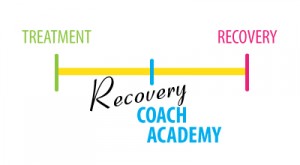- News
- //
- Recovery Coach Academy Helps Bridge the Gap between Treatment and Living a Life of Recovery
Recovery Coach Academy Helps Bridge the Gap between Treatment and Living a Life of Recovery
By Treatment Program Administrator Rae Simpson
 In September, I had the opportunity to attend the Recovery Coach Academy (RCA) at the Recovery Café in Seattle, taught by Jim Wuelfing from the Connecticut Community for Addiction Recovery (CCAR). Jim is a national leader in recovery coaching and highly regarded for his facilitation in the development of recovery community organizations. He has worked for over a decade in helping communities like ours develop recovery-oriented systems of care.
In September, I had the opportunity to attend the Recovery Coach Academy (RCA) at the Recovery Café in Seattle, taught by Jim Wuelfing from the Connecticut Community for Addiction Recovery (CCAR). Jim is a national leader in recovery coaching and highly regarded for his facilitation in the development of recovery community organizations. He has worked for over a decade in helping communities like ours develop recovery-oriented systems of care.
What’s RCA Training?
This week-long training provides an innovative new approach for anyone interested in promoting recovery in their community. RCA also benefits those working with people seeking help with an addiction. Training provides skills to perform a variety of roles that include: recovery coaching, resource broker, role model, mentor, motivator, cheerleader, ally, confidant, problem solver, truth teller, advocate, community organizer, lifestyle consultant, and friend. Training also offers a variety of tools and resources, and emphasizes the skills needed to connect people to resources within their community to promote and maintain recovery.
How Can a Recovery Coach Help?
Through the assistance of a recovery coach, many people in recovery have found a sense of belonging to a larger recovery community. A recovery coach focuses on the recovery potential and not on the pathology of the individual. Most treatment programs deal with the front-end of the problem with little support for transportation, housing, or employment.
A recovery coach helps the client get their life back by bridging the gap between treatment and living a life of recovery. Recovery coaches do not provide clinical services—they are taught how to remove obstacles and barriers while serving as a personal mentor for those seeking recovery.
What’s Next?
By promoting recovery through advocacy, education, and service, we can help end discrimination surrounding addiction and recovery. We can remove barriers and ensure people seeking recovery are treated with dignity and respect. I am pleased to hear Jim has agreed to return to Washington State to provide additional RCA training in our area. I would strongly recommend this training to other healthcare professionals in our community.
